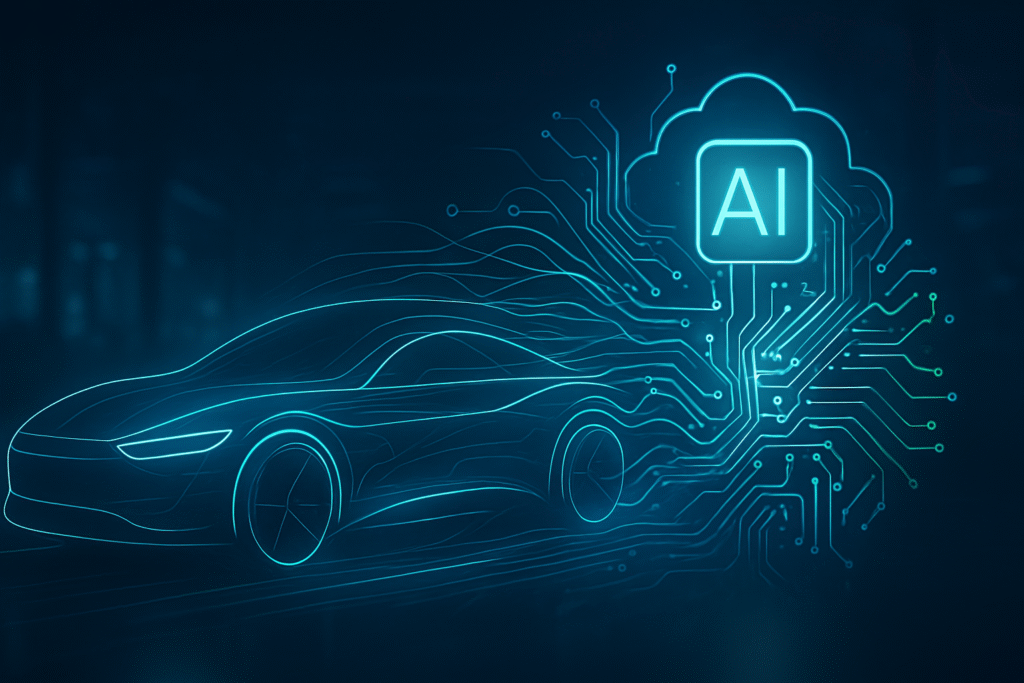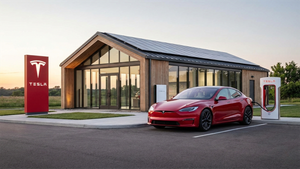
Palo Alto, CA & Wolfsburg, Germany – November 20, 2025 – In a landmark collaboration set to redefine the automotive landscape, electric vehicle innovator Rivian Automotive, Inc. (NASDAQ: RIVN) and global automotive giant Volkswagen AG (XTRA: VOW3) have joined forces to develop a cutting-edge software-defined vehicle (SDV) platform. This strategic alliance, formalized as Rivian and Volkswagen Group Technologies (RV Tech), an equally owned joint venture established in November 2024, is poised to accelerate the integration of advanced AI and machine learning into future vehicles, promising a new era of intelligent mobility and setting a potential industry standard for automotive software. With Volkswagen committing up to $5.8 billion to the venture, the partnership signals a profound shift in how vehicles are designed, built, and experienced, emphasizing a software-first approach that prioritizes continuous innovation and enhanced user capabilities.
The immediate significance of this collaboration is multi-faceted. For Rivian, the substantial financial injection provides crucial capital for its growth, including the ramp-up of its highly anticipated R2 line. It also validates Rivian's pioneering electrical architecture and software, extending its reach far beyond its own brand. For Volkswagen, the partnership offers a vital shortcut in its race to develop advanced SDVs, addressing previous challenges with in-house software development and positioning it to compete more effectively with tech-forward EV leaders. The broader automotive industry sees this as a clear indicator of the necessity for traditional automakers to embrace external expertise and collaboration to navigate the complex, software-driven future of mobility, with the potential for RV Tech to license its platform to other manufacturers.
The Technical Backbone: Zonal Architecture and Unified AI
At the heart of the Rivian-Volkswagen SDV platform lies a state-of-the-art zonal electronic architecture. This design represents a radical departure from traditional automotive electrical/electronic (E/E) architectures, which typically rely on a fragmented network of numerous Electronic Control Units (ECUs) each managing specific functions. Instead, RV Tech’s approach consolidates computing power into powerful, modular central computers that control all vehicle functions within defined zones. Rivian's second-generation (Gen 2) architecture, which forms the basis for this collaboration, aims to reduce the number of in-house developed ECUs from 17 to just seven, a significant decrease compared to the 60+ found in equivalent traditional electric cars. This consolidation drastically simplifies vehicle wiring, potentially cutting harness length by 1.6 miles and reducing weight by 44 pounds per vehicle, leading to a projected 40% cost reduction in the electrical Bill of Materials (BOM).
The software technology underpinning this platform is built on a software-first philosophy, where a unified software stack runs across all vehicle systems. This integrated approach, leveraging AI and machine learning, is foundational for advanced capabilities such as highly automated driving features and sophisticated infotainment systems. Crucially, the platform supports continuous over-the-air (OTA) updates, allowing for ongoing feature enhancements, performance optimization, and the seamless deployment of new AI-driven functionalities throughout the vehicle’s lifecycle. This differs significantly from previous approaches where software updates were often tied to hardware cycles or required dealership visits. Initial reactions from industry experts have lauded the strategic benefits for Volkswagen, enabling it to "lift-and-shift a ready-made architecture" and accelerate its transition to a pure zonal design, thereby avoiding significant in-house development hurdles. However, some reports from late 2025 indicate integration challenges, with tensions arising from adapting Rivian's EV-centric software stack to Volkswagen's diverse portfolio, potentially delaying some Audi, Porsche, and Volkswagen model launches.
The RV Tech joint venture has rapidly expanded its international engineering team to over 1,500 employees across the USA, Canada, Sweden, Serbia, and a newly established hub in Berlin, fostering a global approach to SDV development. Since spring 2025, RV Tech has successfully defined the hardware and electronic architecture specifications for reference vehicles from Volkswagen, Audi, and Scout brands. Development work on engineering prototypes commenced in summer 2025 at RV Tech facilities in Palo Alto and Irvine, California, with rigorous winter validation testing scheduled to begin in Q1 2026. This technical foundation is expected to be integrated into Rivian's R2, R3, and R3X product lines, with the R2 slated for launch in the first half of 2026, and the Volkswagen ID.EVERY1 set to be the first production vehicle to feature this SDV architecture in 2027.
Reshaping the AI and Automotive Landscape
The Rivian-Volkswagen SDV collaboration carries profound implications for AI companies, tech giants, and startups alike. Companies specializing in robust and scalable AI infrastructure, particularly cloud providers like Amazon Web Services (NASDAQ: AMZN), which Rivian already utilizes, and data management platforms such as Databricks, stand to benefit significantly from the increased demand for underlying computational power and data processing. The joint venture's ambition to create a "standard technology stack" for the wider automotive industry, potentially offering its co-developed electrical architecture and software for licensing, could create new market opportunities for AI companies capable of developing specialized, modular applications that integrate seamlessly with RV Tech's platform. This includes niche solutions for advanced sensor fusion, edge AI optimization, or specific in-car experiences.
Conversely, AI companies and startups attempting to build entire automotive software stacks or proprietary autonomous driving systems will face heightened competition from RV Tech's well-funded and globally scalable solution. Major tech giants like Alphabet (NASDAQ: GOOGL) (with Android Automotive OS and Waymo) and Microsoft (NASDAQ: MSFT) (with Azure) will also find a formidable competitor in RV Tech, as it aims to become a foundational software layer for vehicles. If successful, this could limit the market share for alternative proprietary automotive software solutions. The collaboration also poses a significant disruption to traditional Tier 1 automotive suppliers, who have historically provided discrete ECUs and fragmented software. These suppliers will need to pivot rapidly towards offering holistic software modules, advanced sensors, or specialized processing units compatible with zonal SDV architectures.
The partnership also intensifies pressure on other Original Equipment Manufacturers (OEMs), underscoring the challenges of developing complex automotive software in-house. Volkswagen's strategic shift to partner with Rivian, following struggles with its own software arm, Cariad, could serve as a blueprint for other automakers to pursue similar alliances or accelerate their internal AI and software initiatives. By combining Rivian's agile software expertise with Volkswagen's manufacturing might, RV Tech directly challenges EV leaders like Tesla, which, while having its own proprietary stack, is noted to lag in pure zonal architecture integration. The explicit intention to license the SDV platform to other automakers, and potentially even for internal combustion engine (ICE) vehicles, could establish RV Tech as a foundational technology provider, generating new, high-margin revenue and potentially setting a de facto industry standard for automotive software and AI integration, akin to Android in the mobile sector.
Broader Significance and the AI Evolution
The Rivian-Volkswagen SDV collaboration is a powerful testament to the broader AI landscape's evolution and its profound impact on the automotive sector. This partnership firmly places the SDV at the center of future mobility, transforming vehicles into dynamic, AI-powered platforms capable of continuous learning and improvement. The emphasis on in-vehicle intelligence, driven by the zonal architecture and powerful central computing, is foundational for developing advanced automated driving features, predictive maintenance, and highly personalized user experiences. This aligns with the global trend predicting that most vehicles will be AI-powered and software-defined by 2035, with the market for AI in automotive projected to exceed $850 billion by 2030.
This current phase of automotive AI, exemplified by RV Tech, represents a significant leap from earlier milestones. Initial AI applications in vehicles were confined to simpler tasks like engine management or basic ADAS features, relying on rule-based systems. The last decade saw the proliferation of more sophisticated ADAS, leveraging sensors and AI for real-time hazard detection, and enhanced infotainment systems with voice recognition. However, the SDV paradigm shifts AI from being an additive feature to being an integral part of the vehicle's core operating system. This enables holistic "digital driving experiences" that evolve post-purchase through continuous OTA updates, moving beyond siloed AI applications to a foundational transformation of the vehicle's intelligence. Unlike AI breakthroughs in controlled environments, automotive AI operates in dynamic, real-world scenarios with critical safety implications, demanding exceptionally high levels of reliability and ethical consideration in its development.
Despite the immense promise, the collaboration faces potential concerns. Reports from late 2025 highlight "turbulence" within the joint venture, citing integration difficulties and potential delays for several Volkswagen Group models. Tensions over software customization versus standardization, with Rivian favoring a streamlined system and VW brands seeking more flexibility, pose significant challenges. The adaptation of Rivian's EV-centric software for Volkswagen's diverse portfolio, potentially including ICE vehicles, also presents a complex technical hurdle. Furthermore, ensuring robust cybersecurity and data privacy will be paramount as vehicles become more interconnected and reliant on AI. Nevertheless, the strategic importance of this collaboration in accelerating Volkswagen's SDV capabilities and solidifying Rivian's technological leadership underscores its transformative potential.
Future Horizons and Expert Predictions
In the near term, the Rivian-Volkswagen SDV collaboration is set to hit critical milestones. Following the finalization of hardware specifications in spring 2025 and the commencement of engineering prototype development in summer 2025, rigorous winter validation testing of reference vehicles (from Volkswagen, Audi, and Scout brands) is scheduled for Q1 2026. This testing will be crucial for evaluating the SDV architecture's real-world performance under extreme conditions. Rivian's R2 midsize SUV, slated for launch in the first half of 2026, will be an early demonstration of the joint venture's advancements, with Rivian planning to integrate RV Tech's technologies across its R2, R3, and R3X product lines. The Volkswagen ID.EVERY1 is expected to be the first production vehicle from the Volkswagen Group to feature the SDV architecture, with a mass production launch targeted for 2027.
Looking further ahead, Volkswagen Group intends to sequentially integrate the joint SDV architecture into its next-generation electric vehicles built on the Scalable Systems Platform (SSP). The ambitious long-term goal is to deploy this architecture across an impressive 30 million units by 2030, covering a wide range of segments, price points, and international markets. Potential applications and use cases on the horizon include increasingly sophisticated autonomous driving capabilities, highly personalized and responsive infotainment systems, and advanced predictive maintenance features that leverage AI to anticipate and address issues before they arise. The SDV platform's modularity and OTA capabilities mean vehicles will continuously improve throughout their lifespan, offering new features and enhanced performance to consumers.
However, several challenges need to be addressed for the collaboration to fully realize its potential. The reported software integration difficulties and cultural differences between Rivian's agile startup culture and Volkswagen's more traditional corporate structure require careful navigation. Experts predict that while the partnership is a vital step for Volkswagen to overcome its legacy software issues and accelerate its SDV transition, the full benefits may take several years to materialize. The ability to effectively standardize key software components while allowing for brand-specific customization will be a delicate balancing act. Nevertheless, analysts widely agree that this collaboration will significantly hasten Volkswagen's SDV capabilities, simplify the implementation of autonomy and AI functions, and lead to substantial cost savings through reduced wiring and ECU counts.
A New Chapter in AI-Driven Mobility
The Rivian-Volkswagen SDV collaboration represents a pivotal moment in the history of automotive AI, signaling a definitive shift towards software-defined, AI-powered vehicles as the industry standard. The key takeaways from this venture are the strategic importance of combining agile software expertise with global manufacturing scale, the transformative potential of zonal electronic architectures, and the critical role of continuous OTA updates in delivering an evolving user experience. This partnership is not merely about building better cars; it's about creating intelligent, adaptable mobility platforms that can continuously learn, improve, and offer new functionalities throughout their lifecycle.
The significance of this development in AI history within the automotive sector cannot be overstated. It underscores the recognition by even the most established automakers that software, AI, and data are now the primary differentiators, moving beyond traditional hardware and engineering prowess. The long-term impact is expected to be transformative, leading to more efficient vehicle development, substantial cost reductions, and an enhanced, personalized driving experience for consumers. Should RV Tech succeed in licensing its platform to other automakers, it could establish a de facto industry standard, profoundly influencing the trajectory of automotive software and AI integration for decades to come.
In the coming weeks and months, all eyes will be on the Q1 2026 winter testing of the reference vehicles, which will provide crucial insights into the SDV architecture's real-world performance. The launch of Rivian's R2 vehicles in the first half of 2026 will also offer an early glimpse of the joint venture's technological advancements in a production vehicle. Furthermore, it will be critical to monitor how the reported integration challenges and "turbulence" within the joint venture are addressed, and whether any strategic adjustments are made to ensure the timely delivery of Volkswagen Group's upcoming SDV models. The success of this collaboration will not only shape the future of Rivian and Volkswagen but will also serve as a powerful barometer for the entire automotive industry's ability to embrace and leverage the full potential of artificial intelligence.
This content is intended for informational purposes only and represents analysis of current AI developments.
TokenRing AI delivers enterprise-grade solutions for multi-agent AI workflow orchestration, AI-powered development tools, and seamless remote collaboration platforms.
For more information, visit https://www.tokenring.ai/.






